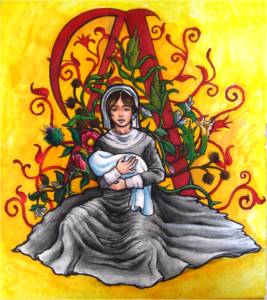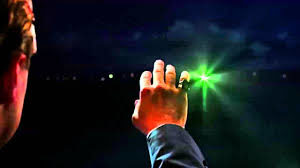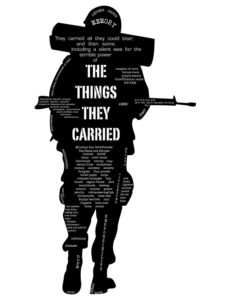 Pearl is a convoluted character, in Nathaniel Hawthorne’s book The Scarlet Letter, with a lot of controversy surrounding her true demeanor and purpose. She is the daughter of Hester Prynne, a woman who has been convicted of adultery and must wear a scarlet letter on her chest for the rest of her life. Through Hawthorne’s words we see that Pearl has multiple facets to her personality. At times she is a wonderful, intelligent, child who redeems Hester and allows her to move on from the negative impacts that the scarlet letter has. At other times, glimpses of a darker nature can be seen as she seemingly afflicts Hester’s emotions knowingly. However Pearl is a child who, like any other child, loves her mother. Pearl’s impact on Hester’s life is a positive one in the end because despite the fact that she acts mischievously and accentuates Hester’s letter at times, she also brings joy into Hester’s life and keeps her on a righteous path.
Pearl is a convoluted character, in Nathaniel Hawthorne’s book The Scarlet Letter, with a lot of controversy surrounding her true demeanor and purpose. She is the daughter of Hester Prynne, a woman who has been convicted of adultery and must wear a scarlet letter on her chest for the rest of her life. Through Hawthorne’s words we see that Pearl has multiple facets to her personality. At times she is a wonderful, intelligent, child who redeems Hester and allows her to move on from the negative impacts that the scarlet letter has. At other times, glimpses of a darker nature can be seen as she seemingly afflicts Hester’s emotions knowingly. However Pearl is a child who, like any other child, loves her mother. Pearl’s impact on Hester’s life is a positive one in the end because despite the fact that she acts mischievously and accentuates Hester’s letter at times, she also brings joy into Hester’s life and keeps her on a righteous path.
Pearl is an impish child sometimes, which can reflect badly on Hester as well as intensify the pain that Hester feels because of her sin and consequent donning of the scarlet letter. For this reason, a reader could interpret Pearl as the embodiment of Hester’s sin and a destructive force in her life, even though she is just a small child. In one instance in the text, Hawthorne demonstrates one of Pearl’s unfortunate tendencies to defy the expectations and wishes of adults, especially Hester. In this case, Hester is trying to show Reverend Wilson, Governor Bellingham, and others that she is worthy of keeping and raising Pearl to be a good worshiper of God. Reverend Wilson poses Pearl the question of who made her. Pearl responds, “with many ungracious refusals to answer good Mr. Wilson’s question, the child finally announced that she had not been made at all, but had been plucked by her mother off the bush of wild roses” (Hawthorne 100). This response makes it seem as if Hester did not, or can not, raise her child to be a faithful worshiper. If Hester is deemed unworthy of this task then Pearl, her only joy in this world, will be taken away from her.
Additionally, the way in which Pearl “ungraciously refuses” to answer Reverend Wilson gives the impression that Pearl is not only not being raised as a good Puritan, but also as an ill-behaved child. While some readers would argue that this is Pearl acting as a destructive force in her mother’s life, Pearl is actually just a defiant child who doesn’t wholly understand what she is doing. Pearl also amplifies the effect of the scarlet letter on Hester Prynne. For example, as they are walking through an old cemetery, Pearl stops to gather prickly burrs and, “taking a handful of these, she arranged them along the lines of the scarlet letter that decorated the maternal bosom, to which the burrs, as their nature was, tenaciously adhered” (Hawthorne 120). Here, it is as if Pearl is adding another layer of pain and torment to the suffering the scarlet letter has brought to her mother. Each time her mother is reminded of her letter it is painful. When Pearl attaches these burrs to her mother’s letter, it is directly reminding her of her sin and all the pain that has come about because of it. This is Pearl’s dark side coming through because she is aware of the significance and effect that the letter has on her mother, yet she does it anyway. The way the burrs “tenaciously adhere” is identical to the way that the letter has tenaciously adhered to Hester. When Pearl attaches the burrs she is only reinforcing this adhesion. Pearl isn’t trying to enhance her mother’s pain by doing this, she is just a playful child who doesn’t realize that what she is doing is causing her mother great pain.
In spite of her negative actions, Pearl is a source of joy and a moral compass for Hester. Pearl is the only thing that matters in Hester’s life after the scarlet letter. When Hester takes Pearl with her to Governor Bellingham’s to discuss Hester’s custody of Pearl she is adamant about keeping her child. After Pearl puts Hester in a bad light with her unfavorable response to Reverend Wilson’s question, Hester is forced to argue with everything she’s got saying, “‘God gave me the child!’ cried she. ‘He gave her, in requital of all things else, which ye had taken from me. She is my happiness!’” (Hawthorne 101). Hester is begging the governor and reverend to keep Pearl. Pearl is the only thing that Hester cares about. She argues that God gave her this child as compensation for the fact that everything else in her life had been taken away from her because of her adultery and the punishment that she was given. With Pearl representing everything that Hester cares about, it is inevitable that she come to be her happiness and joy.
Furthermore, because Pearl is the only thing that matters in Hester’s life, she is also the only thing keeping Hester from losing faith and turning to Satan. After Hester, with the help of Dimmsdale, convinces Governor Bellingham and Reverend Wilson that she is fit to keep Pearl, she is confronted by Mistress Hibbins, a witch. Ms. Hibbins invites Hester to join her in the forest at night to which Hester replies, “Had they taken her from me, I would willingly have gone with thee into the forest, and signed my name in the Black Man’s book” (Hawthorne 105), thus illustrating how Hester would be lost without Pearl. If Pearl had been taken from Hester and given to another family to be raised, Hester would have given in and joined ranks with the Devil. However, because of what Pearl means to Hester and the fact that she has been allowed to raise her, Hester is kept on a righteous path.
Pearl has moments where she negatively affects Hester and moments when she is a positive influence in Hester’s life. Her roguish personality leads to her reminding Hester of her sin and consequently causing Hester pain and torment. However, she is still a child and although she realizes that her actions and the scarlet letter cause Hester pain, she is not fully capable of understanding why. More notably, she is the source of Hester’s joy. Because Pearl is Hester’s only occupation, she is the cause of Hester’s moods both good and bad. Also, she keeps Hester focused on doing good for Pearl’s sake. Pearl has a positive impact on Hester’s life, bringing her joy and keeping her from collapsing under the weight of her sin, even though at times her childish ways can hurt Hester.


 The first part of Nick’s final observation is a specific reference to Gatsby’s “American Dream.” Early in the novel Nick sees Gatsby staring at a “green light” and reaching out for it. Throughout the story we learn that the “green light” is the light on Daisy Buchanan’s dock. We also learn that Gatsby’s dream is to finally be worthy of Daisy’s love and win her over. When Nick says that “Gatsby believed in the green light” he means that Gatsby believes that we can achieve our dream future and that it is eating for us, we just have to work to get it. Nick continues by qualifying the “green light” as the “orgastic future that year by year recedes before us.” This is again showing that Gatsby believed that we can build and work in order to realize our wildest dreams. However, Nick starts to both stray away from Gatsby specifically and point out how difficult and/or impossible it is to achieve that end game. The fact that he describes the dream as “reced[ing] before us” serves to demonstrate the fact that this better future may be an illusion or figment of our imagination. It seems as if he is asking that if we are always chasing and it still gets further, is it ever attainable?
The first part of Nick’s final observation is a specific reference to Gatsby’s “American Dream.” Early in the novel Nick sees Gatsby staring at a “green light” and reaching out for it. Throughout the story we learn that the “green light” is the light on Daisy Buchanan’s dock. We also learn that Gatsby’s dream is to finally be worthy of Daisy’s love and win her over. When Nick says that “Gatsby believed in the green light” he means that Gatsby believes that we can achieve our dream future and that it is eating for us, we just have to work to get it. Nick continues by qualifying the “green light” as the “orgastic future that year by year recedes before us.” This is again showing that Gatsby believed that we can build and work in order to realize our wildest dreams. However, Nick starts to both stray away from Gatsby specifically and point out how difficult and/or impossible it is to achieve that end game. The fact that he describes the dream as “reced[ing] before us” serves to demonstrate the fact that this better future may be an illusion or figment of our imagination. It seems as if he is asking that if we are always chasing and it still gets further, is it ever attainable? Death is a topic that has intrigued and bewildered humans for thousands of years. It’s mystery and the questions that it raises have given way to hundreds of answers and theories and speculation as to what happens after death. In Cormac McCarthy’s post-apocalyptic novel The Road, and the poem “Death, be not proud,” by John Donne, the topic of death is explored in similar ways. Both pieces of literature talk about how in reality, death does not have as much power as it seems, and that it is much more ephemeral than it is commonly thought to be.
Death is a topic that has intrigued and bewildered humans for thousands of years. It’s mystery and the questions that it raises have given way to hundreds of answers and theories and speculation as to what happens after death. In Cormac McCarthy’s post-apocalyptic novel The Road, and the poem “Death, be not proud,” by John Donne, the topic of death is explored in similar ways. Both pieces of literature talk about how in reality, death does not have as much power as it seems, and that it is much more ephemeral than it is commonly thought to be. One of the most devastating weights that the soldiers in O’Brien’s novel carry is bestowed upon them when they lose a comrade because of war. The weight of loss that soldiers experience is more intense than that of normal loss because it happens right in front of them and in gruesome manner. Also, the soldiers feel a sense of responsibility towards protecting each other, so when they are unable to do so they force themselves to carry the weights of blame and guilt because they feel that they let their comrades down. For example, when Curt Lemon dies, Rat Kiley is severely weighed down because of the way in which Lemon died. One minute he was there, the next minute he was pulverized and bits of him were hanging from the trees. The sudden and horrific nature of Lemon’s death is what weighs most on Rat Kiley and the other soldiers. Kiley is unable to carry this weight and act normally at the same time. This is why he mutilates the baby buffalo later on. The weight of Lemon’s terrible death is too much for him to be able to cope with it normally and it reduces his sensitivity and reactivity towards death and suffering, allowing him to carry out terrible acts like killing the baby buffalo. In other instances, the weight brought on by a fellow soldier’s death is guilt and self-blame. For instance, this is the weight that Jimmy Cross carries every time one of his platoon members dies. He blames himself when Ted Lavender dies because he was thinking about his old girlfriend. Even though there is very little he could have done to save Lavender, the responsibility for the lives of his men that he carries as their Lieutenant means that he also carries the blame for their deaths.
One of the most devastating weights that the soldiers in O’Brien’s novel carry is bestowed upon them when they lose a comrade because of war. The weight of loss that soldiers experience is more intense than that of normal loss because it happens right in front of them and in gruesome manner. Also, the soldiers feel a sense of responsibility towards protecting each other, so when they are unable to do so they force themselves to carry the weights of blame and guilt because they feel that they let their comrades down. For example, when Curt Lemon dies, Rat Kiley is severely weighed down because of the way in which Lemon died. One minute he was there, the next minute he was pulverized and bits of him were hanging from the trees. The sudden and horrific nature of Lemon’s death is what weighs most on Rat Kiley and the other soldiers. Kiley is unable to carry this weight and act normally at the same time. This is why he mutilates the baby buffalo later on. The weight of Lemon’s terrible death is too much for him to be able to cope with it normally and it reduces his sensitivity and reactivity towards death and suffering, allowing him to carry out terrible acts like killing the baby buffalo. In other instances, the weight brought on by a fellow soldier’s death is guilt and self-blame. For instance, this is the weight that Jimmy Cross carries every time one of his platoon members dies. He blames himself when Ted Lavender dies because he was thinking about his old girlfriend. Even though there is very little he could have done to save Lavender, the responsibility for the lives of his men that he carries as their Lieutenant means that he also carries the blame for their deaths. The third key is to play video games as often and for as long as you can, preferably on an Xbox One, but a PlayStation will work as well. Playing video games will help relax your mind and body so that you can perform at your maximum potential in the classroom. As you play the games, your subconscious will be going over the information you have learned and basically do your studying for you.
The third key is to play video games as often and for as long as you can, preferably on an Xbox One, but a PlayStation will work as well. Playing video games will help relax your mind and body so that you can perform at your maximum potential in the classroom. As you play the games, your subconscious will be going over the information you have learned and basically do your studying for you. The letter that represents my greatest mistakes is the letter P. P stands for Procrastination. Many times throughout my life I have procrastinated a school project or chore and it has come back to bite me. Even though I had done it in the past, I would just keep putting it off until the absolute last minute. I never learned because I had always been able to finish it in time. Here’s the story of when I finally couldn’t make up for it.
The letter that represents my greatest mistakes is the letter P. P stands for Procrastination. Many times throughout my life I have procrastinated a school project or chore and it has come back to bite me. Even though I had done it in the past, I would just keep putting it off until the absolute last minute. I never learned because I had always been able to finish it in time. Here’s the story of when I finally couldn’t make up for it. The other half of hockey that I carry is my passion for the Montréal Canadiens, the most storied and celebrated franchise in the NHL. The reason why I carry this passion is much easier to trace back than the reason for why I love hockey. My mother is from Montréal and my earliest memory of my family in Montréal is watching Canadiens’ games on Saturday night. Since then, my obsession with the Canadiens has only grown. As I sit here writing this now, I realize that my passion for hockey could stem from these early memories. Either way, the Canadiens have always been something that I can fall back upon and take a break from the mental stresses of school and everyday life.
The other half of hockey that I carry is my passion for the Montréal Canadiens, the most storied and celebrated franchise in the NHL. The reason why I carry this passion is much easier to trace back than the reason for why I love hockey. My mother is from Montréal and my earliest memory of my family in Montréal is watching Canadiens’ games on Saturday night. Since then, my obsession with the Canadiens has only grown. As I sit here writing this now, I realize that my passion for hockey could stem from these early memories. Either way, the Canadiens have always been something that I can fall back upon and take a break from the mental stresses of school and everyday life. or similes like, “they bristled like three roosters,” (Crane 53). These comparisons to animalistic traits signify how they have completely changed their demeanor. The bar no longer has a relaxing environment, but one of ferocious vigor and excitement. This fis further intensified by Crane’s similes comparing the boys to tools of fighting and war. He says, “their clenched fists moved like eager weapons,” (Crane 53). He also compares them to frigates getting ready for battle. This shows the difference in words and expressions from the beginning of the chapter to the midst of the melee.
or similes like, “they bristled like three roosters,” (Crane 53). These comparisons to animalistic traits signify how they have completely changed their demeanor. The bar no longer has a relaxing environment, but one of ferocious vigor and excitement. This fis further intensified by Crane’s similes comparing the boys to tools of fighting and war. He says, “their clenched fists moved like eager weapons,” (Crane 53). He also compares them to frigates getting ready for battle. This shows the difference in words and expressions from the beginning of the chapter to the midst of the melee. Pearl is a convoluted character, in Nathaniel Hawthorne’s book
Pearl is a convoluted character, in Nathaniel Hawthorne’s book 